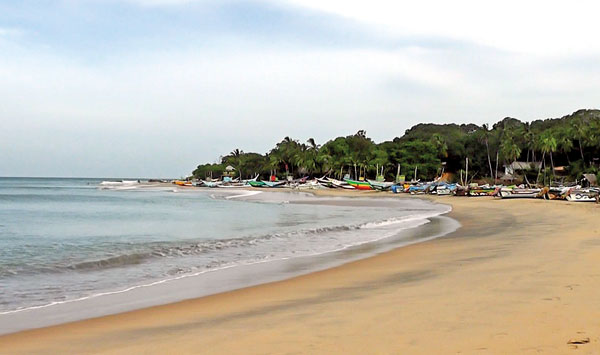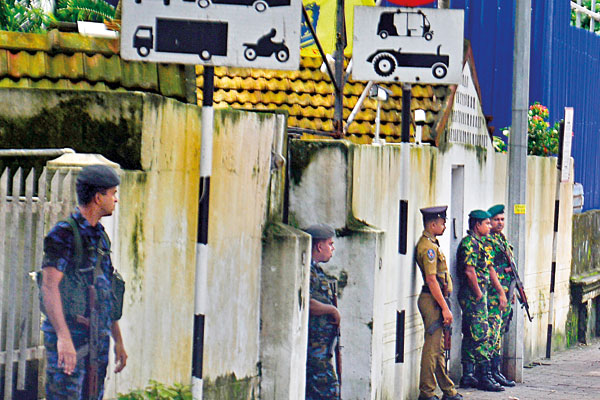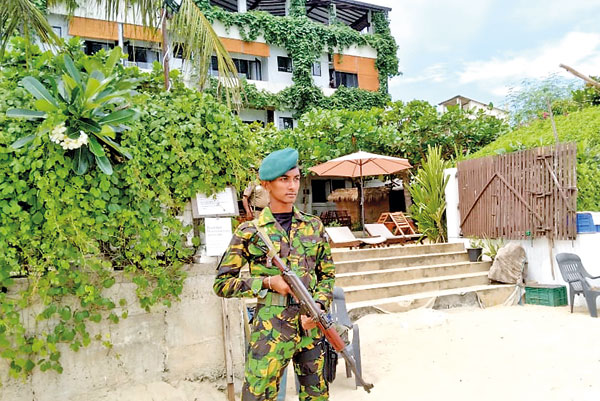News
Tourism sector raises concern about illegal Israeli businesses in Arugam Bay
View(s):
Arugam Bay: The season has ended and there is calm
By Namini Wijedasa
This week, the United States Embassy issued a security alert barring its personnel from travelling to Arugam Bay and advising US citizens to avoid the area based on “credible information warning of an attack targeting popular tourist locations” there.
The United Kingdom and Australia quickly updated their travel advisories based on the US alert. Then, Israel’s National Security Council called on its citizens to “immediately leave” Arugam Bay and the southern and western coastal areas of Sri Lanka.
The threat had been conveyed to the Sri Lankan authorities early this month, the police have already admitted. And action had been taken to secure Arugam Bay and other Israeli-run businesses and prayer houses (chabads) around the country. Sri Lanka’s tourism sector, therefore, was incandescent about the latest travel advisories.

Pix by Palitha Ariyawansa, Wasantha Chandrapala, Eshan Fernando and Priyantha Chandrapala
A statement by the Sri Lanka Tourism Alliance (SLTA), a private sector coalition, asked whether it was “some kind of cruel joke” by a group of foreign embassies. They also drew attention to an issue that was not directly connected to the security threat highlighted by the foreign governments this week—the continuing problem of illegal, Israeli-operated businesses in Arugam Bay.
The Sunday Times has since last year reported on the unregulated foreigner-run businesses in the East and South. But we did not focus on any nationalities as the issue is widespread, with the perpetrators being from several countries. Many of these entities have foreign bank accounts, foreign credit card machines, foreign currency cash payments and even PayPal transfers. In recent months, there have been “rave” parties organised—these are by Israelis—with complaints of narcotics being circulated in addition to light and sound pollution. The financial transactions for these are made abroad, multiple sources said.
The SLTA, too, pointed out that “tensions arose between residents and tourists due to illegal businesses run by tourists using foreign currencies and issues related to visa overstays, which unfortunately have not been effectively addressed by the state.” It urged the authorities to shut down illegal businesses and to ensure that anyone overstaying a visa is deported, as is the norm in most countries.

Heightened security in Arugam Bay
But the travel advisories also drew out a vituperative reaction against Israeli businesses, predominantly on social media and by those who have long railed against this growing problem in the hope that the authorities will act. Occasionally, tensions have also broken out—over raves, in particular.
In the face of this glaring issue, successive governments have stayed silent. Repeated complaints had been made to former President Ranil Wickremesinghe, local tourism sources said. Why, they asked, should legitimate businesses pay their taxes and comply with rules and regulations when foreigners were exploiting loopholes or ignoring the law—assisted by officials whose palms they reportedly routinely oiled—to operate without any hindrance?
The illegal entities had a roughly 30 percent tax advantage (when taking into account all the rates that they were not paying) over legal businesses that did things by the book, Sri Lanka Tourism Development Authority’s (SLTDA) former chairman Priantha Fernando said. He also said the foreigner-led informal sector had grown fast in areas like Arugam Bay, Weligama and Ahangama.

Last year, the SLTDA carried out a pilot project, sending out officials door-to-door to gather registration details of companies to be given to the Department of Immigration and Emigration (DIE). But it was found that some of these entities had a local partner. Some had resident visas and ran a business, even though it was not registered with the SLTDA. There were also other cases that were unauthorised.
“In most cases, the money does not come into the economy,” Mr. Fernando confirmed. For anyone to carry out an effective operation, however, more resources were necessary. There has to be a separate unit, he said, with trained staff to coordinate with tourist police, local police, and the DIE. And that takes money.
What is necessary, the industry says, is to draw these entities into the formal sector—just as it is being done with Sri Lankan businesses—in recognition of the fact that they have multiple direct and indirect benefits to the economy, if done right. There must also be a form of policy decision at the top so that the agencies feel empowered to act.
In some areas, the raves in particular are causing friction. But when complaints are lodged with the police, there is inaction.
As for Arugam Bay, the season has ended and there is calm. Many of the tourists and businesses have moved to the South after what was an especially successful run these past few months. The surf had been good. But the underlying issues—whether it be illegal businesses, unfair competition, or threats linked to global political events—remain. And getting a head start on finding solutions is the only way to ensure the worst is avoided.
The best way to say that you found the home of your dreams is by finding it on Hitad.lk. We have listings for apartments for sale or rent in Sri Lanka, no matter what locale you're looking for! Whether you live in Colombo, Galle, Kandy, Matara, Jaffna and more - we've got them all!

